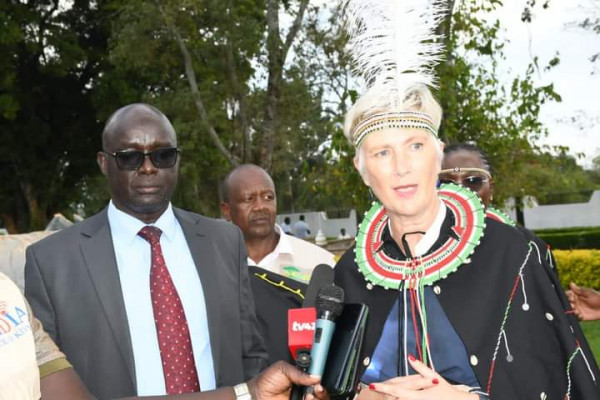Swedish Embassy Delegation Visits IMARA Program Sites in West Pokot
A delegation from the Swedish Embassy, led by Ambassador Caroline Vicini, paid a visit to Governor Simon Kachapin at the county residence to the progress of World Vision-IMARA program sites in the county.
The visit came after the ambassador and her delegation visited World vision-IMARA Program sites in Tartar and Siyoi to assess the progress and impact of the various initiatives highlighting the embassy's commitment to supporting sustainable development in arid and semi-arid lands (ASAL) and fostering peace in the region.
Ambassador Vicini expressed her satisfaction with the ongoing projects, saying, "We are very happy to be here to observe the progress. Our programs are increasingly focused on ASAL counties with various needs, including environment and climate change, diversity and resilience, human rights, democracy, and governance."
One of the key areas of Swedish support has been the promotion of devolution, with a focus on good governance and development. Ambassador Vicini emphasized the importance of sensitizing local communities to hold their governments accountable and actively participate in governance through meaningful engagement.
Addressing the issue of border peace, Ambassador Vicini stated, "Without peace, countries cannot develop." She urged the county and its neighbors to find lasting solutions to border conflicts.
West Pokot County has benefited from several projects supported by the Swedish government, addressing critical challenges through alternative livelihoods programs and pasture availability.
Governor Kachapin lauded the Swedish government for the impact its initiatives have had on local communities and their livelihoods. He acknowledged the role of partners and stakeholders in creating sustainable change and growth.
“I'm hopeful that your continued support will go a long way towards effecting positive change in West Pokot County,” noted Governor Kachapin.
During the visit, the delegation assessed various projects funded by the Swedish government, including honey processing and packing and coffee farming in Tartar and biogas and pasture projects in Siyoi.
The IMARA Program, initially conceived for dry areas, takes a holistic approach to transforming livelihoods, focusing on peace, environmental sustainability and business development. It seeks to create a positive impact on the lives of the local population and empower them to build a more prosperous and peaceful future.
